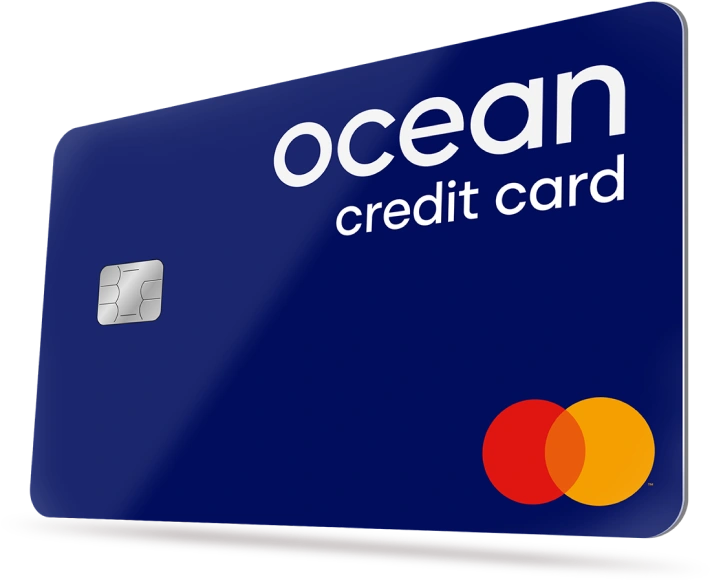What is a credit card for bad credit?
If you’ve had issues with credit in the past, you could still be eligible for a credit card for bad credit.
These cards are designed for people with a limited or poor credit history. They can help you access funds and improve your credit score, as long as you stay within your credit limit and make your payments on time. Keep in mind that missing payments could negatively impact your score.
Why apply for the Ocean Credit Card?
- See if you’re eligible - without affecting your credit score
- Get a response in just 60 seconds
- Get a credit limit up to £1,500
- Credit limit increases available if eligible (remember, a larger balance could take longer to pay back and increase the amount of interest you’re paying)

How to get a credit card for bad credit
Applying for the Ocean Credit Card is simple and takes just 60 seconds. If you’re over 18 and live in the UK, you could be eligible.
- Check your eligibility - Complete our simple form.
- Apply online - Get a yes or no in 60 seconds.
- If accepted - You’ll receive your card within 10 days.
What is bad credit?
Your credit score is a number used by credit reference agencies (CRAs) to help give lenders an overall view of how you manage money.
Bad credit refers to a lower credit score, usually the result of missed payments, high debt levels, or limited credit history. A low credit score can make it harder to get approved for loans, credit cards, or other financial products.
Why do I have bad credit?
If you have a poor credit score, it could be down to a few things, like:
- Missed payments on loans or credit cards
- Multiple credit applications within a short period
- Financial ties to someone with bad credit
- Errors or incorrect information on your credit report
- Defaulted accounts
- County Court Judgments (CCJs)
- Individual Voluntary Arrangements (IVAs) or bankruptcy
These marks on your credit file are removed after six years, even if any debt remains unpaid.
A low credit score can also result from having limited or no borrowing history, often referred to as a "thin credit history".

Am I eligible for a credit card with bad credit?
If you have bad credit, you may still be eligible for a credit card designed specifically for people in your situation. These bad credit credit cards are designed for those with low credit scores, limited credit history, or previous financial difficulties.
Eligibility criteria is different from lender to lender, but most will consider things like your income, employment status, and current debt levels.
Keep in mind that while you are more likely to be approved for a bad credit credit card, the terms may include a higher interest rate and a lower credit limit.
How can I improve my eligibility for a credit card?
Being accepted for a credit card could be a matter of a few simple steps. These include:
- Joining the electoral roll. Registering to vote helps lenders verify your identity and address and takes 5 minutes.
- Paying off small debts. Clearing any outstanding balances, even small ones, can boost your credit score.
- Checking for errors on your credit report. Correcting any mistakes can quickly improve your chances of being accepted.
39.9% APR Representative (variable)
Personal Finance WriterIf you've struggled with poor credit in the past, a credit card designed for bad credit could help you improve your score. By making your payments on time and keeping within your credit limit, you can show lenders you're able to manage credit responsibly. Just remember, this is still a form of debt, so it’s important to pay off your card each month.
How to use a credit card to build your credit score
If you have poor credit, using a credit card responsibly can help improve your score.
- Pay your balance in full whenever possible.
- Always make at least the minimum payment to avoid penalties.
- Pay on time, every time—consider setting up a Direct Debit to automate this.
- Keep your balance below 25% of your credit limit to show responsible use.
By following these steps, you can become eligible for better deals next time you apply for credit.
What is a good credit score?
There’s no universally ‘good’ or ‘bad’ credit score, as it varies depending on the credit reference agency and lender.
Each of the three main credit reference agencies uses its own scoring system, and every lender has unique criteria for approving applications. So, if you’ve been declined before, it doesn’t necessarily mean you’ll be turned down again by another lender.
Here’s what the credit score ranges look like from each credit reference agency:
| Credit score | Equifax | Experian | TransUnion |
| Very Poor | – | 0 – 560 | 0 – 550 |
| Poor | 0 – 438 | 561 - 720 | 551 - 565 |
| Fair | 439 - 530 | 721 - 880 | 566 - 603 |
| Good | 531 - 670 | 881 - 960 | 604 - 627 |
| Very Good | 671 - 810 | - | - |
| Excellent | 811 - 1,000 | 961 - 999 | 628 - 710 |

Need help with debt?
Life can take an unexpected twist when we least expect it. If you're struggling with debt, talk to your lender straight away to see if there’s anything they can do to help. For more information and free, impartial advice, get in touch with:
Citizens Advice MoneyHelper National Debtline StepChange MoneyWellness
What should I look for when choosing a bad credit credit card?
When selecting a credit card for bad credit, consider the following factors:
- Interest rates: Look for the lowest interest rate available, but remember that paying your balance in full each month can help you avoid interest charges altogether.
- Credit limit: Check the initial credit limit and whether the lender offers opportunities for increasing it as you show responsible use.
- Fees: Be aware of any annual fees, late payment fees, or charges for going over your credit limit.
- Additional benefits: Some cards may offer perks like cashback or rewards. While these can be a bonus, focus primarily on the card's terms and how they align with your financial goals.
Choosing the right card can help you rebuild your credit while avoiding unnecessary costs.
How could we help you?
Ocean has provided access to loans, credit cards and mortgages to people across the UK since 1991. In this time, we’ve pre-approved more than a million people, offering products and advice to suit their circumstances.
- All credit histories considered
- Check your eligibility without affecting your credit score
- Save time finding the right loan deal
You can learn more about Ocean on our about us page.
Last updated
Fact-checked
This page has been reviewed to ensure it is accurate and compliant with FCA guidelines.
For more information on our fact-checking process, read our editorial policy.











